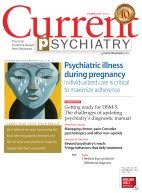Wednesday, December 2, 2009
Late-life depression: Managing mood in patients with vascular disease
Helen Lavretsky, MD, MS, Associate professor of psychiatry, Semel Institute for Neuroscience and Human Behavior, David Geffen School of Medicine at UCLA, Los Angeles, CA
Thomas Meeks, MD, Assistant professor of psychiatry, Division of geriatric psychiatry, VA San Diego Healthcare System, Sam and Rose Stein Institute for Research on Aging, University of California, San Diego
Newly diagnosed major depressive disorder (MDD) in patients age ≥65 often has a vascular component. Concomitant cerebrovascular disease (CVD) does not substantially alter the management of late-life depression, but it may affect presenting symptoms, complicate the diagnosis, and influence treatment outcomes.
The relationship between depression and CVD progression remains to be fully explained, and no disease-specific interventions exist to address vascular depression’s pathophysiology. When planning treatment, however, one can draw inferences from existing studies. This article reviews the evidence on late-life depression accompanied by CVD and vascular risk factors, the “vascular depression” concept, and approaches to primary and secondary prevention and treatment.
Read full text (free access)
Comment on this article
Email the editor
Subscribe to:
Post Comments (Atom)


No comments:
Post a Comment